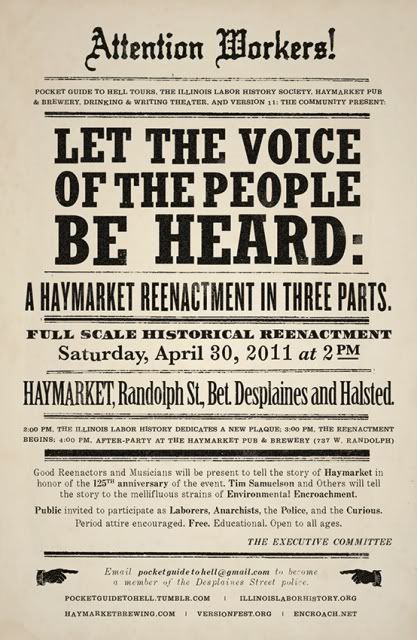The Incident in more detail:
Haymarket MassacreThe Haymarket affair (also known as the Haymarket massacre) was a demonstration and unrest that took place on Tuesday May 4, 1886, at the Haymarket Square in Chicago. It began as a rally in support of striking workers. An unknown person threw a bomb at police as they dispersed the public meeting. The bomb blast and ensuing gunfire resulted in the deaths of eight police officers, mostly from friendly fire, and an unknown number of civilians. In the internationally publicized legal proceedings that followed, eight anarchists were tried for murder. Four men were convicted and executed, and one committed suicide in prison, although the prosecution conceded none of the defendants had thrown the bomb.
The deeply polarized attitudes separating business and working class people in late 19th-century Chicago are generally acknowledged as having precipitated the tragedy and its aftermath.
In October 1884, a convention held by the Federation of Organized Trades and Labor Unions unanimously set May 1, 1886, as the date by which the eight-hour work day would become standard. As the chosen date approached, U.S. labor unions prepared for a general strike in support of the eight-hour day.
Estimates of the number of striking workers across the U.S. range from 300,000 to half a million.
The rally began peacefully under a light rain on the evening of May 4. August Spies spoke to the large crowd while standing in an open wagon on Des Plaines Street while a large number of on-duty police officers watched from nearby. According to witnesses, Spies began by saying the rally was not meant to incite violence. Historian Paul Avrich records Spies as saying "there seems to prevail the opinion in some quarters that this meeting has been called for the purpose of inaugurating a riot, hence these warlike preparations on the part of so-called 'law and order.' However, let me tell you at the beginning that this meeting has not been called for any such purpose. The object of this meeting is to explain the general situation of the eight-hour movement and to throw light upon various incidents in connection with it."
The crowd was so calm that Mayor Carter Harrison, Sr., who had stopped by to watch, walked home early. Samuel Fielden, the last speaker, was finishing his speech at about 10:30 when police ordered the rally to disperse and began marching in formation towards the speakers' wagon. A pipe bomb was thrown at the police line and exploded, killing policeman Mathias J. Degan. The police immediately opened fire. Some workers were armed, but accounts vary widely as to how many shot back. The incident lasted less than five minutes.
An anonymous police official told the Chicago Tribune, "A very large number of the police were wounded by each other's revolvers. ... It was every man for himself, and while some got two or three squares away, the rest emptied their revolvers, mainly into each other."
The Chicago Herald described a scene of "wild carnage" and estimated at least fifty dead or wounded civilians lay in the streets.
Eight people connected directly or indirectly with the rally and its anarchist organizers were arrested afterward and charged.
The prosecution, led by Julius Grinnell, did not offer credible evidence connecting the defendants with the bombing but argued that the person who had thrown the bomb was not discouraged to do so by the defendants, who as conspirators were therefore equally responsible.
Albert Parsons' brother claimed there was evidence linking the Pinkertons to the bomb.
The jury returned guilty verdicts for all eight defendants – death sentences for seven of the men, and a sentence of 15 years in prison for Neebe. The sentencing sparked outrage from budding labor and workers' movements, resulted in protests around the world, and elevated the defendants as international political celebrities and heroes within labor and radical political circles.
After the appeals had been exhausted, Illinois Governor Richard James Oglesby commuted Fielden's and Schwab's sentences to life in prison on November 10, 1887. On the eve of his scheduled execution, Lingg committed suicide in his cell with a smuggled dynamite cap which he reportedly held in his mouth like a cigar (the blast blew off half his face and he survived in agony for six hours).
The next day (November 11, 1887) Spies, Parsons, Fischer and Engel were taken to the gallows in white robes and hoods. They sang the Marseillaise, then the anthem of the international revolutionary movement. Family members including Lucy Parsons, who attempted to see them for the last time, were arrested and searched for bombs (none were found). According to witnesses, in the moments before the men were hanged, Spies shouted, "The time will come when our silence will be more powerful than the voices you strangle today!" Witnesses reported that the condemned men did not die immediately when they dropped, but strangled to death slowly, a sight which left the spectators visibly shaken.
The trial has been characterized as one of the most serious miscarriages of justice in United States history. Most working people believed Pinkerton agents had provoked the incident. On June 26, 1893, Illinois Governor John Peter Altgeld signed pardons for Fielden, Neebe, and Schwab after having concluded all eight defendants were innocent. The governor said the reason for the bombing was the city of Chicago's failure to hold Pinkerton guards responsible for shooting workers. The pardons ended his political career.
Commemoration of May Day became an annual event the following year.
The association of May Day with the Haymarket martyrs has remained strong in Mexico. Mary Harris "Mother" Jones was in Mexico on May 1, 1921, and wrote of the "day of 'fiestas'" that marked "the killing of the workers in Chicago for demanding the eight-hour day". In 1929 The New York Times referred to the May Day parade in Mexico City as "the annual demonstration glorifying the memory of those who were killed in Chicago in 1886." The New York Times described the 1936 demonstration as a commemoration of "the death of the martyrs in Chicago." An American visitor in 1981 wrote that she was embarrassed to explain to knowledgeable Mexican workers that American workers were ignorant of the Haymarket affair and the origins of May Day.
linkThe poor, the working class do not get their history told. What should be known by every American is practically unknown.
"For my part, whatever anguish of spirit it may cost, I am willing to know the whole truth; to know the worst and provide for it." - Patrick Henry
The level of injustice and wrong you endure is directly determined by how much you quietly submit to. Even to the point of extinction.





